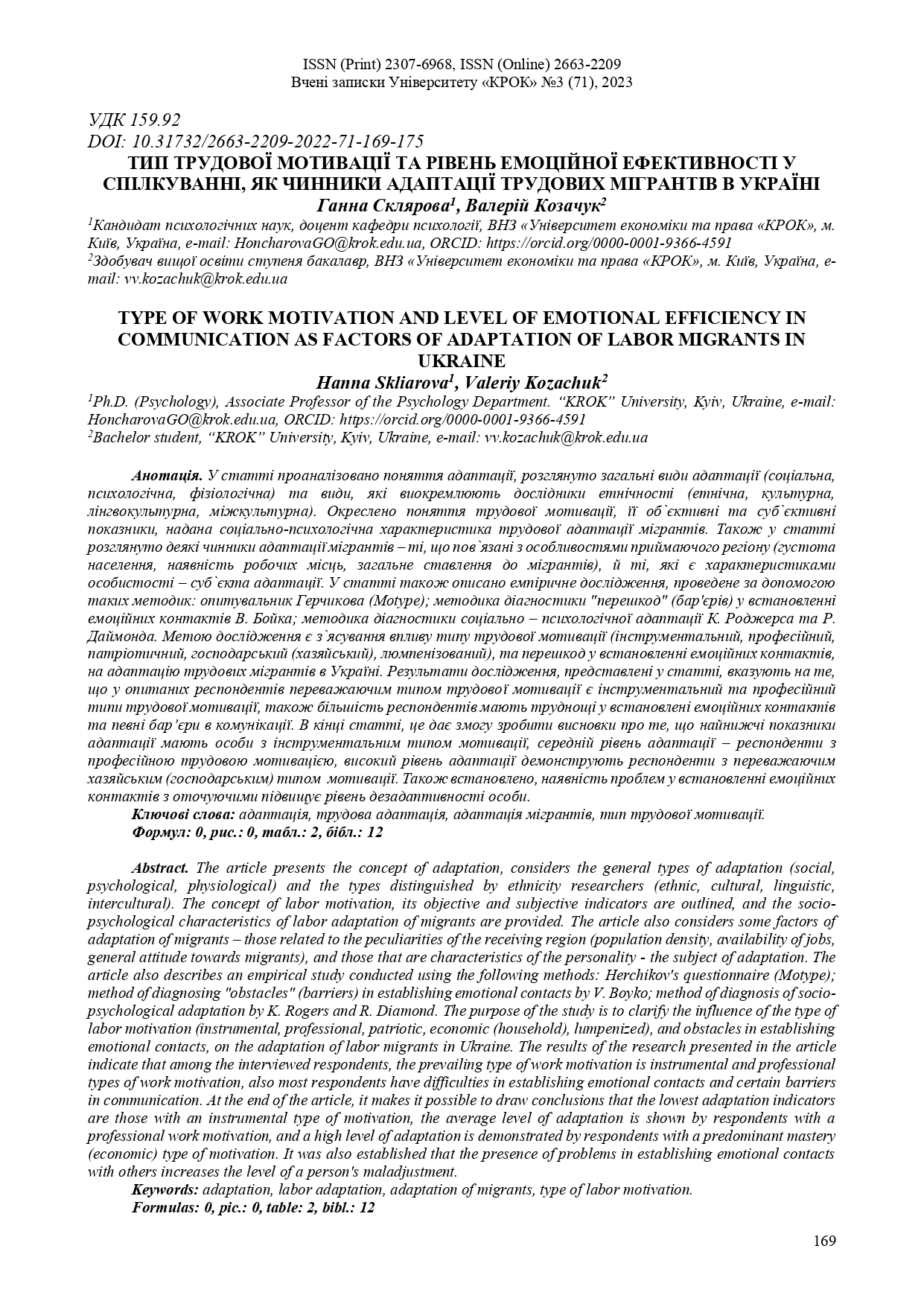TYPE OF WORK MOTIVATION AND LEVEL OF EMOTIONAL EFFICIENCY IN COMMUNICATION AS FACTORS OF ADAPTATION OF LABOR MIGRANTS IN UKRAINE
DOI:
https://doi.org/10.31732/2663-2209-2022-71-169-175Keywords:
adaptation, labor adaptation, adaptation of migrants, type of labor motivationAbstract
The article presents the concept of adaptation, considers the general types of adaptation (social, psychological, physiological) and the types distinguished by ethnicity researchers (ethnic, cultural, linguistic, intercultural). The concept of labor motivation, its objective and subjective indicators are outlined, and the socio-psychological characteristics of labor adaptation of migrants are provided. The article also considers some factors of adaptation of migrants – those related to the peculiarities of the receiving region (population density, availability of jobs, general attitude towards migrants), and those that are characteristics of the personality - the subject of adaptation. The article also describes an empirical study conducted using the following methods: Herchikov's questionnaire (Motype); method of diagnosing "obstacles" (barriers) in establishing emotional contacts by V. Boyko; method of diagnosis of socio-psychological adaptation by K. Rogers and R. Diamond. The purpose of the study is to clarify the influence of the type of labor motivation (instrumental, professional, patriotic, economic (household), lumpenized), and obstacles in establishing emotional contacts, on the adaptation of labor migrants in Ukraine. The results of the research presented in the article indicate that among the interviewed respondents, the prevailing type of work motivation is instrumental and professional types of work motivation, also most respondents have difficulties in establishing emotional contacts and certain barriers in communication. At the end of the article, it makes it possible to draw conclusions that the lowest adaptation indicators are those with an instrumental type of motivation, the average level of adaptation is shown by respondents with a professional work motivation, and a high level of adaptation is demonstrated by respondents with a predominant mastery (economic) type of motivation. It was also established that the presence of problems in establishing emotional contacts with others increases the level of a person's maladjustment.
Downloads
References
Баденіна, О. (2014). Значення процесу адаптації для ефективного управління персоналом. Управління розвитком, № 8, 34-35.
Карамушка Л.М. (2004). Психологія освітнього менеджменту : навч. посібникК.: Либідь, 2004. 424с.
Колот А.М. (2002). Мотивація персоналу. К.: КНЕУ. 337 с.
Кондрюкова, В. (2011). Адаптація до професійної діяльності: соціально-психологічний аспект. Правничий вісник Університету «КРОК», Вип. 9, 139-143.
Сидоренко, С. (2008). Cоціальна адаптація людини в умовах глобального суспільства [Автореф. дис. канд. філософ. наук, Запорізький національний університет]. Основний фонд Запорізького національного університету.
Ухова, А. (2020). Соціокультурна адаптаційна поведінка інтелектуального мігранта в новому середовищі. Вісник Київського національного університету імені Тараса Шевченка. Міжнародні відносини, 1(51), 47-49.
Зливков В.Л., Лукомська С.О. & Федан О.В. (2016). Психодіагностика особистості у кризових життєвих ситуаціях. К.: Педагогічна думка. 219 с.
Ярошенко, В., & Передало, Х. (2018). Адаптація працівників – мігрантів: актуальність сьогодення в умовах євроінтеграції. Економічний аналіз: зб. наук. праць. Тернопільський національний економічний університет, Том 28, № 1, 105 – 114.
DiMaria, C.H., & Peroni, C., & Sarracino, F. (2020). Happiness Matters: Productivity Gains from Subjective Well-Being. Journal of Happiness Studies, Springer, vol. 21(1), 139-160.
Mc Loughlin, & E., Priyadarshini, A. (2021). Adaptability in the workplace: Investigating the adaptive performance job requirements for a project manager. Project Leadership and Society, Volume 2.
Synhaivska, I., Kutas, M. (2018). The applications of interactive methods for the development of competencies in management psychology. Innovations in science: The challenges of our time (collective monograph). Ontario, Canada: Accent Graphics Communications & Publishing. 84–92.
Hung, H.V. (2017). Happy workers value effort, sad workers value reward. The International Journal of Human Resource Management, 28(11), 1591–1624. https://doi.org/10.1080/09585192.2015.1128458.

Downloads
Published
How to Cite
Issue
Section
License

This work is licensed under a Creative Commons Attribution-NonCommercial 4.0 International License.

